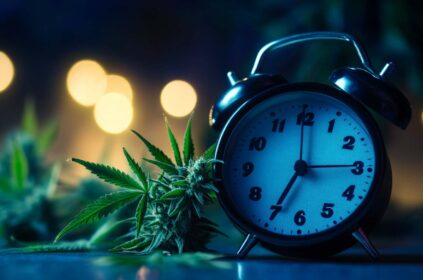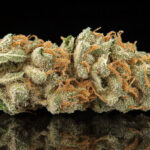Comparing CBD and Delta 9 for Sleep Quality: A Comprehensive Guide
Introduction
In a world where restful sleep often feels out of reach, many are turning to natural alternatives to combat the sleeplessness that plagues millions. Among these options, hemp-derived products like CBD and Delta 9 THC are emerging as popular choices. With approximately 19.2% of adults in the U.S. suffering from insomnia—equating to a staggering 46.2 million people—it’s essential to dive deep into understanding these cannabinoids and how they may impact sleep quality.
Understanding CBD and Delta 9 THC
CBD (Cannabidiol)
CBD is a non-intoxicating compound extracted from hemp. Unlike its psychoactive counterpart, Delta 9 THC, CBD does not produce a “high.” Instead, it interacts with the endocannabinoid system (ECS), which plays a critical role in regulating various bodily functions, including sleep.
- Sleep Benefits: Research indicates that CBD can improve sleep quality, primarily through its anxiolytic (anxiety-reducing) properties. Some studies show that higher doses of CBD may extend total sleep time and diminish nighttime awakenings, although low doses may have the opposite effect, increasing wakefulness.
- Mechanism of Action: CBD works by balancing the ECS, influencing inflammation levels, brain health, pain management, and stress response—all factors that can significantly affect sleep patterns.
- Clinical Evidence: A study conducted in 2019 highlights the potential of CBD for enhancing sleep quality, with more subjects reporting improvements rather than disruptions in their sleep. While the long-term effects require further investigation, initial findings are promising.
- Dose-Dependent Effects: It’s important to note that CBD’s effects are dose-dependent. Higher doses may promote sleep while lower doses can increase alertness, making individualized dosing crucial for finding the optimal balance.
Delta 9 THC
Delta 9 THC is the most prevalent form of THC found in cannabis plants and is well-known for its psychoactive effects that lead to the classic “high.”
- Sleep Benefits: Many users report that Delta 9 THC helps them fall asleep more quickly and increases total sleep duration. Additionally, it may enhance deep sleep, which is vital for physical recovery and cognitive health.
- Mechanism of Action: Delta 9 interacts primarily with CB1 receptors in the brain, effectively regulating sleep-wake cycles and fostering relaxation. This can be particularly beneficial for those struggling with anxiety and pain, which often impede restful sleep.
- Dose-Dependent Effects: Similar to CBD, Delta 9 THC exhibits dose-dependent effects. Lower doses may alleviate anxiety and facilitate sleep, while higher doses can paradoxically increase anxiety and interfere with sleep patterns. Chronic use can result in tolerance and might lead to impaired REM sleep and rebound insomnia upon discontinuation.
Comparing CBD and Delta 9 for Sleep
Navigating the nuances between CBD and Delta 9 THC can be quite revealing, especially when assessing their roles in promoting sleep.
Onset and Duration of Sleep
- CBD: While high doses are shown to increase total sleep time and reduce disturbances during the night, the effects on how quickly it helps individuals fall asleep are less clear. CBD tends to offer more subtle enhancements in overall sleep quality rather than immediate relief from sleep onset issues.
- Delta 9 THC: On the other hand, Delta 9 THC excels at reducing the time it takes to fall asleep and lengthening the duration of sleep. For those needing a swift solution to sleeplessness, Delta 9 THC often makes a more significant impact in the short term.
Anxiety and Pain Relief
- CBD: CBD’s ability to alleviate anxiety can indirectly enhance sleep quality. Its non-psychoactive nature means it can be safer for long-term use, providing a way to manage anxiety without the risk of dependency.
- Delta 9 THC: Although Delta 9 THC can relieve anxiety and pain, exceeding optimal dosages can lead to heightened anxiety levels instead. The long-term implications of its use—such as building tolerance or having decreased sleep quality after cessation—should also be considered.
Long-Term Effects and Safety
- CBD: CBD is generally considered safe for long-term use with minimal risk of adverse side effects. It does not typically lead to dependence or withdrawal, making it a favorable choice for those seeking sustained sleep support.
- Delta 9 THC: In contrast, long-term use of Delta 9 THC can result in various issues, including the potential for tolerance, diminished REM sleep, grogginess upon waking, and rebound insomnia after use. These factors make it less ideal for those looking for a long-term sleep strategy.
Alternatives and Combinations
For those who seek options beyond CBD and Delta 9 THC, a variety of alternatives are available:
- Other Cannabinoids: Compounds like CBG (cannabigerol) and CBN (cannabinol) present non-psychoactive alternatives that may assist with sleep without the risks associated with THC. For instance, CBG has been noted for its potential to decrease anxiety and stress, promoting relaxation.
- Combination Products: Products that combine Delta 9 THC with CBD, such as infused edibles, can create a balanced approach to sleep management. The CBD can help counterbalance some of the negative effects of THC, offering a synergistic benefit that may enhance overall sleep quality.
Conclusion
Ultimately, when deciding between CBD and Delta 9 THC for sleep quality, it’s crucial to evaluate personal needs, sensitivities to THC, and long-term goals for wellness.
- CBD emerges as a non-psychoactive, safer option that tackles sleep issues through anxiety reduction and ECS support, making it appropriate for long-term use without dependence concerns.
- Delta 9 THC, although effective for fast relief from sleep onset issues and increasing sleep duration, carries the weight of potential risks including tolerance, reduced REM sleep, and a likelihood of rebound insomnia over time.
As you explore your options, consider these actionable takeaways:
- Start with Low Doses: If you choose Delta 9 THC, begin with a low dosage to gauge how your body responds, adjusting as needed while keeping track of any effects.
- Combine Cannabinoids: Using products that feature a blend of Delta 9 THC and CBD might strike a balance between effectiveness and safety for managing sleep.
- Explore Alternatives: If THC’s psychoactive effects concern you, look into other cannabinoids like CBG or CBN, which may deliver sleep-enhancing benefits without intoxication.
By understanding the distinct attributes and potential drawbacks of both CBD and Delta 9 THC, you can make well-informed decisions to effectively optimize your sleep quality and overall well-being.
For deeper insights into hemp-derived products and their benefits, consider exploring more resources and information available on our blog.





















